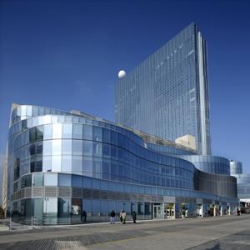Revel Casino closed on Tuesday, after only two years and four months in operation. The resort’s demise is seen by many as a symbol of Atlantic City’s economic decline. To many, Revel Casino is a symbol of excessive ambition and poor judgment.
When the Revel Casino opened in April 2012, it was the most expensive casino in the history of Atlantic City. Revel was touted as “The Next Big Thing”. At the launch, the $2.4 billion casino complex was already considered to be troubled. Though the resort had been conceived as a Las Vegas-style gaming destination and skyline feature, one of the original investors (Morgan Stanley) took a $900 million loss when it left the project before opening day. That may have turned out to be a wise decision.
Grand Opening in 2012 – Bankruptcy in 2013
On opening night, Lt. Governor Kim Guadagno attended and had toasts with the president of the casino. Journalists and engineering experts described the building as the most exciting design on the east coast. Everything seemed set to make the casino a huge success, but that never materialized.
Liditze Diaz, who worked at one of the restaurants in Revel, said she had a hard time believing such a beautiful tower would ever go bankrupt. Diaz said, “When I started, it was promising. We had high hopes.Then we started hearing rumors, but I thought, ‘No way this place is going to close. It’s too new, too pretty.’ It’s hard to believe.”
Pennsylvania Racinos Drained Customer Base
Below the surface, Revel Casino faced many challenges–some self-inflicted, some systemic. When Revel opened on April 2, 2012, it launched in a market that had seen 6 steady years of decline. Atlantic City reached its peak revenues in 2006, when the industry collected $5.4 billion in revenues. In 2013, those revenues had declined to $2.86 billion.
The gaming laws passed in Pennsylvania in 2004 had a huge effect on Atlantic City. The people of Pennsylvania and adjacent states long had trekked to Atlantic City for their gambling fun. In 2005 and beyond, more and more began to stay home to play at the racinos and casinos in Pennsylvania. So did gamblers in other nearby states, including residents of North Jersey.
Market Saturation and Hurricane Sandy
The bad economy doubled the casino’s economic troubles. After the collapse of the real estate market in 2008, Americans had less money for gambling. Sound financial decisions by mass market gamblers and high rollers alike helped kill Revel Casino, just as market saturation and increased competition had caused stresses in the market. When Hurricane Sandy hit, it was a third major event that harmed the New Jersey gambling industry.
Hurricane Sandy cannot be blamed on the Revel Entertainment Gorup or Morgan Stanley, because it occurred in October 2012–six months after the opening of Revel. But many people have wondered aloud why anyone would plan a $2.4 billion casino development in the middle of the Great Recession and when facing greater competition than ever.
NJ Gambler Praises Revel Casino
Ruthie Fenimore, a gambler from Warren, New Jersey, says the resort deserved better than it got. Fenimore said, “It’s a shame. I really love this place. This place would be perfect if it was in Las Vegas. It would be right up there with Wynn. All the restaurants were awesome and HQ is the best nightclub I’ve ever been to in New Jersey. I remember the first time I came here, I was lying on the bed opening and closing the curtains with a remote control. It blew my mind. The bathroom was bigger than my home.”
Everyone agrees that the design of the Revel Casino was beautiful and even innovative, though. The execution of the plan was pulled off skillfully. But the plan was bad. As the old saying goes, “Bad strategy trumps good tactics.” What goes in war and sports seems to stand for the gambling industry, too.
Other Closing Casinos
Over the weekend, The Showboat Casino also was closed. The Showboat’s closure is less a matter of personal performance and more a matter of executive decisions. The Showboat drew in $7 million in revenues over the last quarter. It was profitable.
The owners of the Showboat, Caesars Entertainment, carries $23 billion in debt. Caesars president Gary Loveman believes Atlantic City needs fewer casinos for those surviving to succeed, so he closed one of Caesars’ four properties in the city. In doing so, America’s largest gaming company was able to cut thousands of jobs, figuring most of those gamblers will end up in Caesars’ other local operations. The gaming company still retains the Showboat’s customer database, which is a key in marketing to gamblers.
Failing Atlantic City Market
Trump Plaza will close in less than 2 weeks, too. When Trump Plaza closes, it will be the fourth casino to close in Atlantic City this year, including the Atlantic Club in January. The closings bring the number of surviving casinos to eight, and signal the weakness of the market. Borgata is the most financially successful of the Atlantic City casinos (Borgata collects 1/2 of the profits), but shares of Borgata are down 84% over the past year. Trump Entertainment shares are down 90%.

